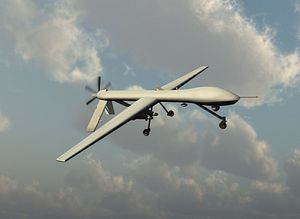At least, that is what the New America Foundation’s Peter Bergen said recently, a revelation that was backed by a statement from an unnamed official in Islamabad.
With a sharp decline in the number of drone strikes from 2010 onwards, and no strikes at all so far in 2014, it seems as if the Obama administration, ahead of a complete withdrawal from Afghanistan in 2016, has finally decided to wrap up the CIA drone campaign in the Federally Administered Tribal Areas, or FATA.
Bergen, while commenting on Obama’s security policies, wrote that the lack of infrastructure due to the U.S. pullout, as well as a shift in drone focus towards Yemen and Somalia, has effectively ended the drone campaign in Pakistan’s lawless frontier.
Professor Brian Glyn Williams, author of Predators: The CIA’s Drone War on Al Qaeda, also believes that Obama and the CIA may have called it a day on drone strikes in FATA. Responding to a question about the future of drone strikes in Pakistan, he said: “The CIA has indeed ended its aggressive drone program in Pakistan. Despite all the claims in the Pakistani media that the drones were killing ‘hundreds of Pakistani civilians a week’ the truth is that the drones had systematically annihilated Al Qaeda and killed thousands of allied Taliban, not innocent civilian bystanders. There are fewer and fewer HVTs (High Value Targets) left to be killed.”
According to Bergen’s New America Foundation, which has tracked every strike over the past decade, drones have killed a minimum of 258 civilians and 1,600 militants in Pakistan, with no civilian casualties reported in 2013. There have been close to 370 strikes since 2004, killing more than 50 high-profile leaders of the Taliban, Al Qaeda, and its affiliates.
During this time, drones been portrayed to the Pakistani people as one of the greatest evils to have ever engulfed the country. This is a narrative driven largely by the Pakistani media and the country’s politicians.
Pakistan’s electronic media has boomed over the past decade, especially during the Musharraf regime, and the country now has close to 90 independent television channels, compared to just three before Musharraf. This boom, coupled with impressive print media circulations, changed not only the political dynamics, but also the way people consumed and synthesized information.
The media in Pakistan now has the power to shape the public discourse on major issues, notably the CIA drone strikes in FATA. And the position of the Pakistani media on drone strikes has been very heavily critical. This discourse is predominantly based on the fact that drones were a U.S. tool, violating Pakistan’s sovereignty, and apparently killing “thousands” of innocent civilians. (Official estimates in Pakistan of civilian casualties have varied: In October 2013, sources in Islamabad claimed the number of civilian deaths to be around 400, but the government late backtracked from this number, reporting a mere 67 deaths since 2008.)
While media outlets occasionally quoted figures from Pakistani and U.S. officials designating victims as “suspected” militants, their commentaries and op-eds insisted that those died were mostly civilians.
Politicians, meanwhile, have also been outspoken on drones, for instance when high-profile Taliban leaders are killed.
The death of Wali-ur-Rehman, a Taliban spokesperson, in a May 2013 drone strike is one example. Imran Khan, the popular politician and leader of the Tehreek-e-Insaf Party, tagged Rehman as a “pro-peace” Taliban, willing to negotiate peace with Islamabad. According to Khan, Rehman should not have been killed. Yet Rehman was associated with, and represented, the Tehrik-i-Taliban Pakistan, an outfit responsible for a number of terrorist attacks in Pakistan.
Khan, the Pakistani politician who has been most vocal against drones, bases his stance on the assumption that the strikes have fuelled militancy. His open opposition to drone strikes, with emphasis solely on civilian deaths and not on those of militants, has resonated among his many supporters.
A more recent example was the killing of TTP head Hakimullah Mehsud in a November 2013 drone strike. At the time, Mehsud was not only Pakistan’s public enemy number one but also one of the most brutal leaders to have led a militant faction in the country. Yet Mehsud’s death was officially condemned by the Nawaz government as an attempt to sabotage the peace process in Pakistan.
Farhat Taj, a Pashtun academic and expert, has debunked the common drone discourse writing that “people of Waziristan are suffering a brutal kind of occupation under the Taliban and al Qaeda. Therefore, they welcome the drone attacks.” Taj’s opinion is supported by many in FATA, who believe that drones, even with their loopholes, are high precision weapons mostly targeting militants.
A student from Mohmand Agency, FATA, while talking to me on the issue, was of the view that “many in his tribal agency, as well as Waziristan, believe that drones are highly precise compared to military operations, and thus result in minimal civilian loss.”
Christine Fair, Karl Kaltenthaler and William J Miller, writing for The Atlantic on Pakistan’s drone discourse, argued: “In fact, many Pakistanis support the drone strikes. This suggests that there is room for the United States to engage in a public diplomacy campaign to win over more Pakistanis to the idea that drone strikes are not the bringers of carnage that is so often portrayed in the Urdu-language media in Pakistan.”
This alternate view on drone strikes goes largely unremarked in the Pakistani media, as does the fact that the campaign has eliminated a number of high-profile militants and terrorists, with Pakistan’s consent.
Farooq Yousaf is working as a research analyst and editor at the Centre for Research and Security Studies, Islamabad, while currently based in Germany. He tweets as @faruqyusaf and can be reached at [email protected]

































